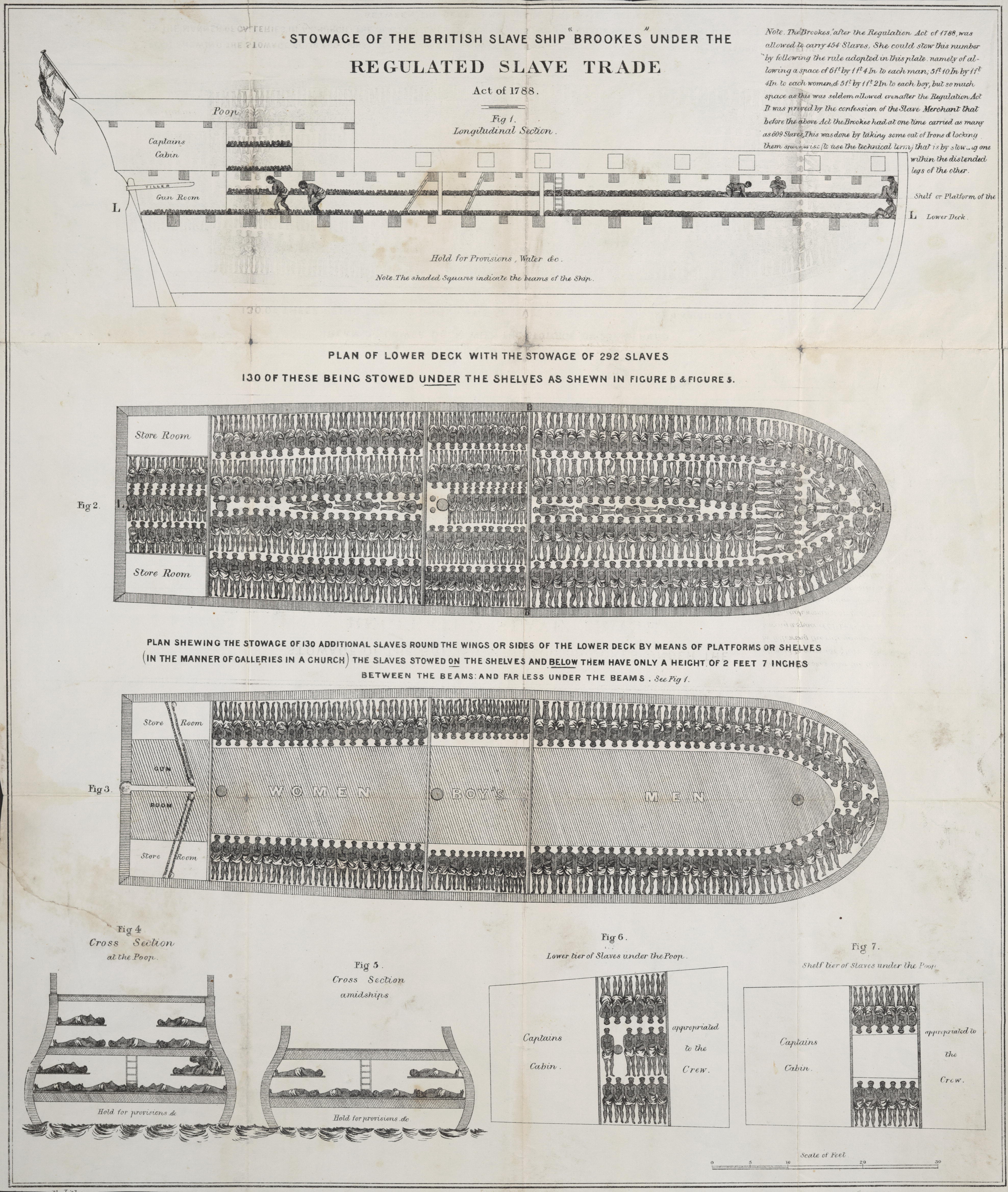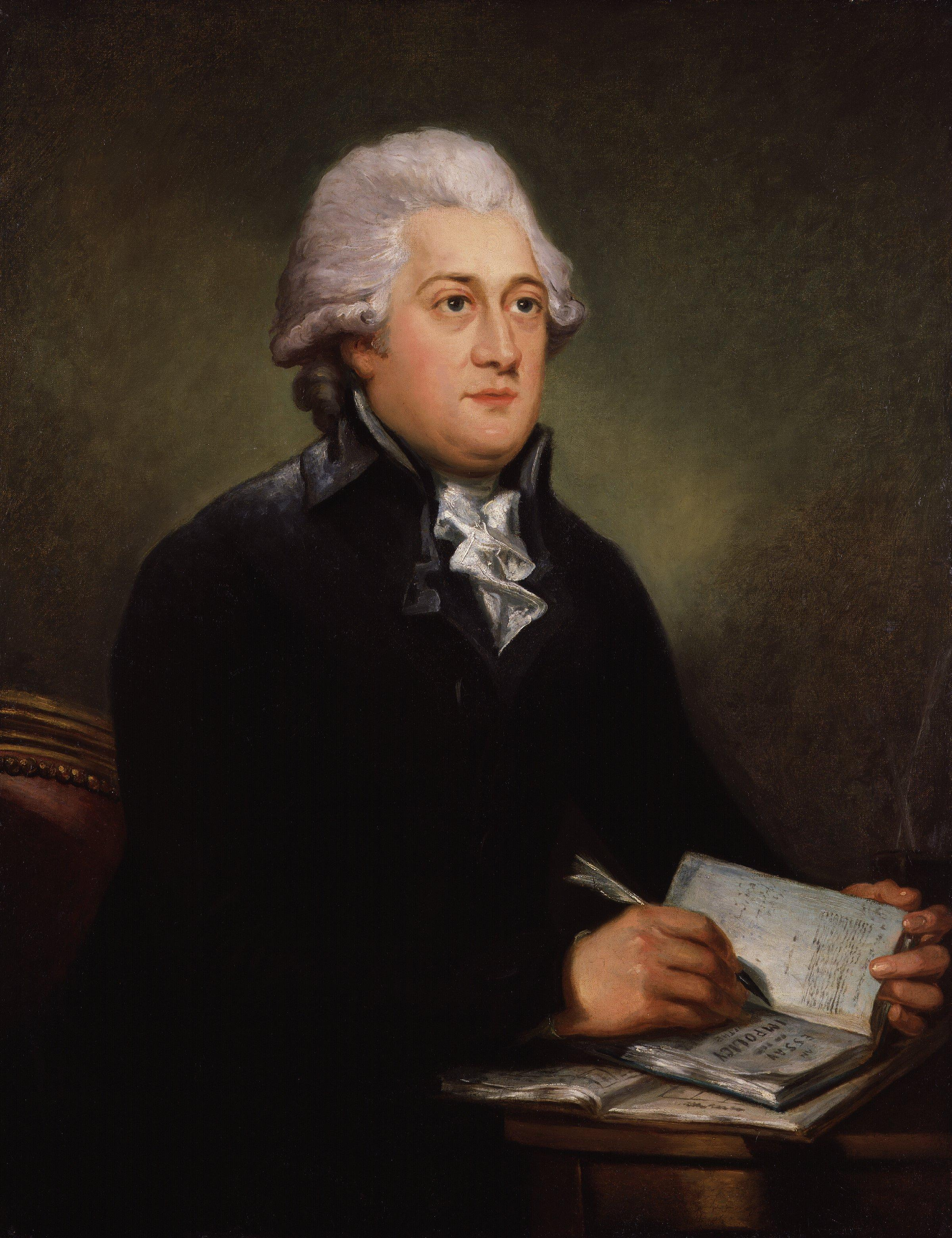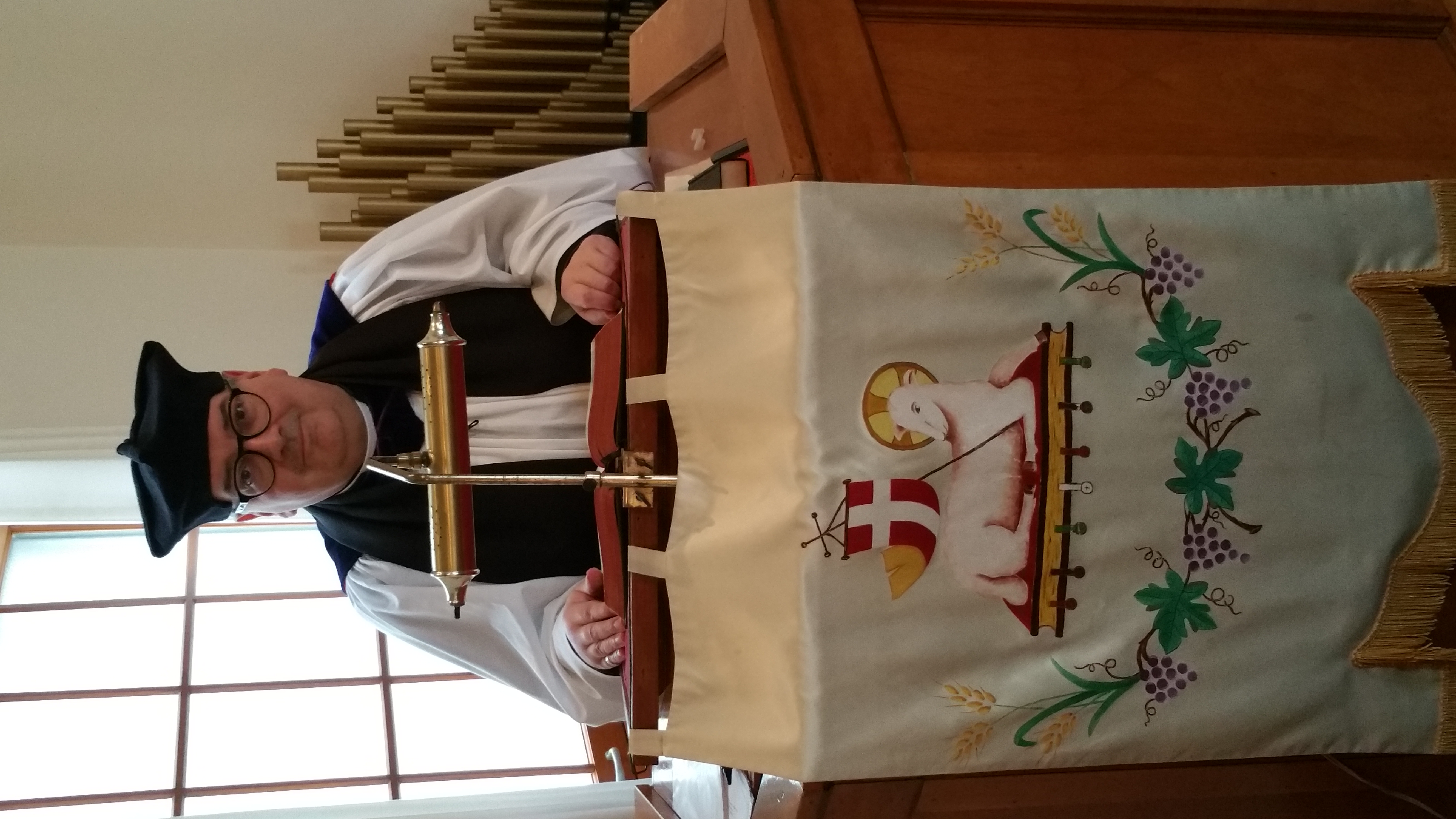|
Thomas Clarkson (abolitionist)
Thomas Clarkson (28 March 1760 – 26 September 1846) was an English abolitionist, and a leading campaigner against the slave trade in the British Empire. He helped found The Society for Effecting the Abolition of the Slave Trade (also known as the Society for the Abolition of the Slave Trade) and helped achieve passage of the Slave Trade Act 1807, which ended British trade in slaves. He became a pacifist in 1816 and, together with his brother John, was among the twelve founders of the Society for the Promotion of Permanent and Universal Peace. In his later years, Clarkson campaigned for the abolition of slavery worldwide. In 1840, he was the key speaker at the Anti-Slavery Society's (today known as Anti-Slavery International) first conference in London which campaigned to end slavery in other countries. Early life and education Clarkson was the eldest son of the Reverend John Clarkson (1710–1766), a Church of England priest and master of Wisbech Grammar School, and ... [...More Info...] [...Related Items...] OR: [Wikipedia] [Google] [Baidu] |
Carl Frederik Von Breda
Carl Frederik von Breda (16 August 1759 – 1 December 1818) was a Swedish painter who studied in and spent much of his career in Britain before becoming painter to the Swedish court. He was born in Stockholm in 1759, and moved to Britain where he was a student of Joshua Reynolds. Breda specialized in painting portraits and was called "the van Dyck of Sweden". He returned to Sweden 1796 where he became professor at the Academy of Arts, a popular portraitist, and a court painter. Breda married at age 22 and his son, Johan Fredrik, was also a painter, who studied under his father. Breda died in Stockholm in 1818. Breda painted James Watt. Early life Breda's great-grandfather Pieter emigrated to Stockholm around the year 1670 from the Netherlands. The "von Breda" family name seems to indicate a connection with the city of Breda. ''Von'' is not a Dutch preposition, but in the Nordic countries, this originally German preposition has occasionally been used as a part of names of ennobl ... [...More Info...] [...Related Items...] OR: [Wikipedia] [Google] [Baidu] |
Blue Plaque
A blue plaque is a permanent sign installed in a public place in the United Kingdom and elsewhere to commemorate a link between that location and a famous person, event, or former building on the site, serving as a historical marker. The term is used in the United Kingdom in two different senses. It may be used narrowly and specifically to refer to the "official" scheme administered by English Heritage, and currently restricted to sites within Greater London; or it may be used less formally to encompass a number of similar schemes administered by organisations throughout the UK. The plaques erected are made in a variety of designs, shapes, materials and colours: some are blue, others are not. However, the term "blue plaque" is often used informally to encompass all such schemes. The "official" scheme traces its origins to that launched in 1866 in London, on the initiative of the politician William Ewart, to mark the homes and workplaces of famous people. It has been administe ... [...More Info...] [...Related Items...] OR: [Wikipedia] [Google] [Baidu] |
Francis Moore (geographer)
Francis Moore (baptized 1708, died in or after 1756) was a British travel writer of the 18th century. Moore was born in Worcester, England, but few details are known about his early life. He came into prominence after publishing ''Travels into the Inland Parts of Africa'' in 1738. The abolitionist Thomas Clarkson attributed his commitment to the anti-slavery cause to reading the few experts on Africa of the time, including Moore. Account of Africa Moore was appointed a writer (i.e., clerk) by the Royal African Company in 1730 and sailed for the company's Gambia River entrepôt on July of that year. He left the region in April 1735 after also serving as a factor (agent) for the company. Moore was one of the first Englishmen to travel into the interior of Africa, serving in and visiting numerous towns and trading posts along the Gambia River from its mouth to the Guinea Highlands, hundreds of miles inland. Moore's observations were published as ''Travels Into the Inland Parts of ... [...More Info...] [...Related Items...] OR: [Wikipedia] [Google] [Baidu] |
Abolitionism In The United States
In the United States, abolitionism, the movement that sought to end slavery in the country, was active from the late colonial era until the American Civil War, the end of which brought about the abolition of American slavery through the Thirteenth Amendment to the United States Constitution (ratified 1865). The anti-slavery movement originated during the Age of Enlightenment, focused on ending the trans-Atlantic slave trade. In Colonial America, a few German Quakers issued the 1688 Germantown Quaker Petition Against Slavery, which marks the beginning of the American abolitionist movement. Before the Revolutionary War, evangelical colonists were the primary advocates for the opposition to slavery and the slave trade, doing so on humanitarian grounds. James Oglethorpe, the founder of the colony of Georgia, originally tried to prohibit slavery upon its founding, a decision that was eventually reversed. During the Revolutionary era, all states abolished the international sla ... [...More Info...] [...Related Items...] OR: [Wikipedia] [Google] [Baidu] |
Quaker
Quakers are people who belong to a historically Protestant Christian set of Christian denomination, denominations known formally as the Religious Society of Friends. Members of these movements ("theFriends") are generally united by a belief in each human's ability to experience Inward light, the light within or see "that of God in every one". Some profess a priesthood of all believers inspired by the First Epistle of Peter. They include those with evangelicalism, evangelical, Holiness movement, holiness, Mainline Protestant, liberal, and Conservative Friends, traditional Quaker understandings of Christianity. There are also Nontheist Quakers, whose spiritual practice does not rely on the existence of God. To differing extents, the Friends avoid creeds and Hierarchical structure, hierarchical structures. In 2017, there were an estimated 377,557 adult Quakers, 49% of them in Africa. Some 89% of Quakers worldwide belong to ''evangelical'' and ''programmed'' branches that hold ... [...More Info...] [...Related Items...] OR: [Wikipedia] [Google] [Baidu] |
Anthony Benezet
Anthony Benezet, born Antoine Bénézet (January 31, 1713May 3, 1784), was a French-American abolitionist and educator who was active in Philadelphia, Pennsylvania. One of the early American abolitionists, Benezet founded one of the world's first anti-slavery societies, the Society for the Relief of Free Negroes Unlawfully Held in Bondage (after his death it was revived as the Pennsylvania Society for Promoting the Abolition of Slavery); the first public school for girls in North America; and the Negro School at Philadelphia, which operated into the nineteenth century. He was a vegetarian and advocated for the kind treatment of animals, integrating this in his teachings. Biography Antoine was born in Saint-Quentin, France, to Jean-Étienne de Bénézet (later known as John Stephen Benezet) and his wife Judith de la Méjanelle, who were Huguenots (French Protestants). The Huguenots had been persecuted and suffered violent attacks in France since the 1685 revocation of the Edic ... [...More Info...] [...Related Items...] OR: [Wikipedia] [Google] [Baidu] |
Slave Trade
Slavery and enslavement are both the state and the condition of being a slave—someone forbidden to quit one's service for an enslaver, and who is treated by the enslaver as property. Slavery typically involves slaves being made to perform some form of work while also having their location or residence dictated by the enslaver. Many historical cases of enslavement occurred as a result of breaking the law, becoming indebted, or suffering a military defeat; other forms of slavery were instituted along demographic lines such as race. Slaves may be kept in bondage for life or for a fixed period of time, after which they would be granted freedom. Although slavery is usually involuntary and involves coercion, there are also cases where people voluntarily enter into slavery to pay a debt or earn money due to poverty. In the course of human history, slavery was a typical feature of civilization, and was legal in most societies, but it is now outlawed in most countries of the w ... [...More Info...] [...Related Items...] OR: [Wikipedia] [Google] [Baidu] |
Peter Peckard
Peter Peckard (c. 1718 – 8 December 1797) was an English Whig, Vice-Chancellor of Cambridge University, Church of England minister and abolitionist.Peter Peckard: Biography and bibliography - Brycchan Carey 2002. Retrieved 29 March 2010. From 1781 he was Master of . He was incorporated at in 1782, appointed in ... [...More Info...] [...Related Items...] OR: [Wikipedia] [Google] [Baidu] |
Latin
Latin (, or , ) is a classical language belonging to the Italic branch of the Indo-European languages. Latin was originally a dialect spoken in the lower Tiber area (then known as Latium) around present-day Rome, but through the power of the Roman Republic it became the dominant language in the Italian region and subsequently throughout the Roman Empire. Even after the fall of Western Rome, Latin remained the common language of international communication, science, scholarship and academia in Europe until well into the 18th century, when other regional vernaculars (including its own descendants, the Romance languages) supplanted it in common academic and political usage, and it eventually became a dead language in the modern linguistic definition. Latin is a highly inflected language, with three distinct genders (masculine, feminine, and neuter), six or seven noun cases (nominative, accusative, genitive, dative, ablative, and vocative), five declensions, four verb conjuga ... [...More Info...] [...Related Items...] OR: [Wikipedia] [Google] [Baidu] |
Deacon
A deacon is a member of the diaconate, an office in Christian churches that is generally associated with service of some kind, but which varies among theological and denominational traditions. Major Christian churches, such as the Catholic Church, the Oriental Orthodox Churches, the Eastern Orthodox Church, the Scandinavian Lutheran Churches, the Methodist Churches, the Anglican Communion, and the Free Church of England, view the diaconate as an order of ministry. Origin and development The word ''deacon'' is derived from the Greek word (), which is a standard ancient Greek word meaning "servant", "waiting-man", "minister", or "messenger". It is generally assumed that the office of deacon originated in the selection of seven men by the apostles, among them Stephen, to assist with the charitable work of the early church as recorded in Acts of the Apostles chapter 6. The title ''deaconess'' ( grc, διακόνισσα, diakónissa, label=none) is not found in the Bible. Ho ... [...More Info...] [...Related Items...] OR: [Wikipedia] [Google] [Baidu] |
Anglican Ministry
The Anglican ministry is both the leadership and agency of Christian service in the Anglican Communion. "Ministry" commonly refers to the office of ordained clergy: the ''threefold order'' of bishops, priests and deacons. More accurately, Anglican ministry includes many laypeople who devote themselves to the ministry of the church, either individually or in lower/assisting offices such as lector, acolyte, sub-deacon, Eucharistic minister, cantor, musicians, parish secretary or assistant, warden, vestry member, etc. Ultimately, all baptized members of the church are considered to partake in the ministry of the Body of Christ. Each of the provinces (usually corresponding to individual world nations) of the Anglican Communion has a high degree of independence from the other provinces, and each of them have slightly different structures for ministry, mission and governance. However, personal leadership is always vested in a member of the clergy (a bishop at provincial and diocesan l ... [...More Info...] [...Related Items...] OR: [Wikipedia] [Google] [Baidu] |








